- Home
- Ricoh Global Newsroom
- Stories
- Ricoh's vision of "WORK" innovation
Special Dialogue Ricoh's vision of "WORK" innovation Let's elevate creativity and explore "Fulfillment through Work"
- Fulfillment through Work
- Diversity, Equity, and Inclusion

Left
Sachiko Nakajima
Sachiko Nakajima is a musician, a mathematics researcher, and a STEAM Educator. She is also CEO of steAm, Inc., the representative director of steAm BAND Association and one of the thematic project producers of Expo 2025, Osaka, Kansai, JAPAN. She passionately conducts various activities and creations on music, mathematics, art, technology, and STEAM education.
* What is STEAM Education?・・・A creative, hands-on, and playful method of interdisciplinary learning across the worlds of Science, Technology, Engineering, Arts, Liberal Arts, and Mathematics.
Right
Yoshinori Yamashita
President and CEO Ricoh Company, Ltd.
Index
Ricoh's vision for 2036 is "Fulfillment through Work."
We want to release workers from the tedium of repetitive tasks and
deliver a revolution in "work" that leads to a sense of fulfillment, accomplishment, and self-realization.
What does it take for workers to appreciate their thoughts and ideas and make the most of their creativity?
Jake Yamashita sat down with the talented Ms. Sachiko Nakajima,
whose diverse talents span the fields of music, mathematics, and education.
Seize the changing times as an opportunity and take a new step forward
Yamashita: I have often said, "uncertainty is the only certainty there is." In other words, I think people can no longer keep up with the changes in the world. To put it bluntly, changes that used to take 50 years are now happening in a single year or six months. Being unable to respond to them, we call today "an era where nobody can foresee what will happen." I believe we need to pause and ask ourselves: Are we really enjoying our lives? Can we really live the same way we used to? What does a truly great society look like? Then we realize that returning to the days before the COVID-19 pandemic is not an option. Ms. Nakajima, you describe the coming era as one of "the democratization of creativity," what do you think it will be like?
Nakajima: In 20th-century society, people were generally divided into two groups: those who gave and those who received. With the development of the Internet, however, everyone's potential creativity can now be shared in both directions. As anyone can write a novel or a poem or make a video and publish it nowadays, the idea that "it is good for everyone to be different" has become a basic norm shared by the whole of society. I think we have a renewed sense of the value of everyone owning their feelings and opinions and communicating them. I hope that everyone in the world can become a creator of the future.
Yamashita: Although we live in a time when everyone can demonstrate their abilities, I am concerned that young people may be discouraged by the term "lost decades*" and lose self-confidence. It is not them but their environments, such as upbringing and education that limit their potential and ambitions. As a corporate organization, we want to encourage a mindset that sees the changes everyone can bring as opportunities. I also believe companies, politicians, and Japan as a country need to learn more from the world and make positive changes.
* A period of Japan's economic stagnation since 1991
Nakajima: Given the right environment, anyone is likely to be willing to take on challenges. It is only natural not to get it right the first time, so it is essential to take the first step, like practicing how to fall when learning to ride a bike or ski. Doing so can make at least some of the ideas come true. On the contrary, if you fear and do nothing, you will be left behind and even more afraid of the times.
Yamashita: It is important for those who observe the challenge to see how the other person reacts when they fall. It is nice to be praised for a good fall.
Nakajima: If a company's CEO openly offered support, employees would be energized! Let's foster a company-wide culture that encourages people to challenge themselves without fear of failure.
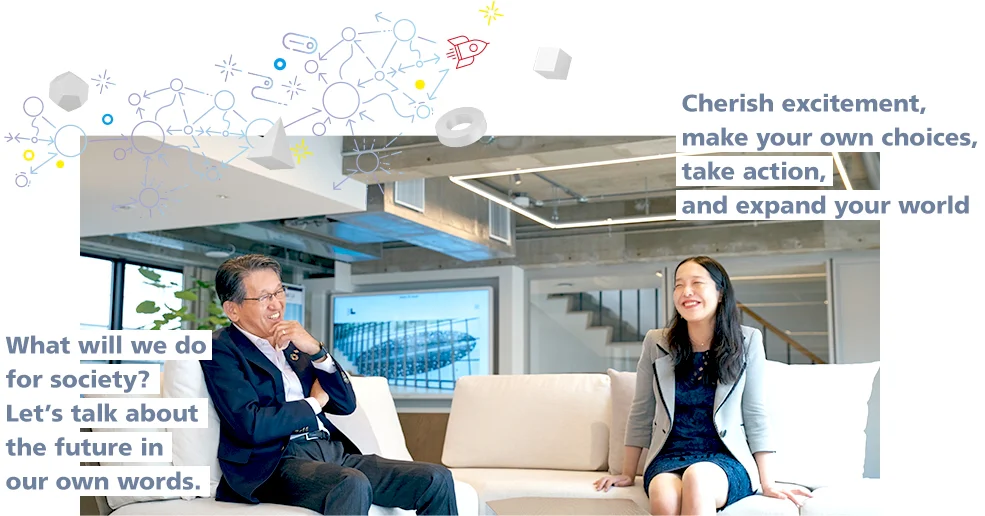
It is "fulfilling" to work and learn. Let's value that excitement
Yamashita: Ms. Nakajima, you are involved in Science, Technology, Engineering, Arts, Liberal Arts, Mathematics (STEAM) education. What do you think is an important concept in the learning process?
Nakajima: It is indeed the "fulfillment" of learning. We would be squandering that joy if we were bound by "I have to do this" or "I need to achieve this level of results" when we are learning because we love it. Instead, we should start by being excited to be motivated. This applies to not only learning but also working or creating something. The STEAM education I'm working on represents an attitude of living with a challenging spirit and excitement.
I am involved in the Ministry of Economy, Trade and Industry's "Classroom of the Future," where we are experimenting with new ways of learning using technology under new curriculum guidelines. We are focusing on a positive cycle of "knowing" and "creating" built around excitement. Rather than creating value as an adult after acquiring a lot of knowledge, I think it's essential to continue the spiral of knowing, creating, and knowing more while creating.
Yamashita: Playing doesn't have a specific goal, but working and learning do, so creativity may tend to be more limited.
Nakajima: It's an interesting perspective. Because we can do anything when we play, it is easy for unplanned behavior to occur. If you are playing in the sandbox alone, other kids might turn up and start playing together or make a sandcastle for someone.
Yamashita: On the other hand, the starting point to think about work is the customers. Customer needs are very broad and change rapidly. If we cannot envision what they want, we won't be able to set the right objectives. Ricoh's value is in staying close to our customers and providing value to them. Furthermore, enabling employees to use digital tools to streamline their workflow and broaden their scope of work would make their jobs more fulfilling. Ms. Nakajima, what do you think is vital to enhance excitement and creativity in the workplace?
Nakajima: Work is about creating value, and that is inherently fulfilling. Because there is no absolute response to a customer needs, staying close to them is a process of asking questions and finding answers together. We should also get excited when we see the customer's heart dance when they find the solution to their problem.
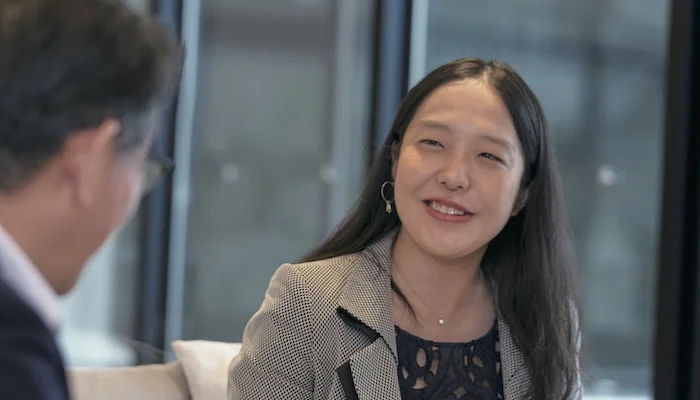
Yamashita: Exactly! "Work is inherently fulfilling." In Mr. Yasuhiro Oyama's book, "The Happiness of Work," he writes that the following elements are necessary for people to feel happy. The first is to be praised, the second is to feel useful, and the last is to be needed. I am convinced that we can achieve all of these elements through "working," which will give us a sense of excitement, fulfillment, and connection with society. Therefore, Ricoh is committed to helping society as a whole to feel fulfillment through work. Turning this process into a business may take a little while. However, if more and more companies begin to think, "We want to be just like Ricoh," we will be able to make a gradual impact on society.
Communicate your ideas and work for society as autonomous, self-motivated talent
Yamashita: Ms. Nakajima, how you live your life seems to influence those around you positively. What kind of mindset has guided your career?
Nakajima: Since we only live once, perhaps I have been practicing "staying in the now," even when I have worries or hesitation. There are many different axes of perspectives and values, so I feel as if I am creating a new axis for myself. I think, decide, act independently, and take responsibility for my actions. When you broaden your experience this way, the world you see expands and becomes more intriguing. Sometimes I find myself in the minority. For example, women often excel in the world of mathematics, but they find their interests and creativity are often stifled for social reasons. I wish our society would become more inclusive so that we all realize that everyone being different is actually a good thing.
Yamashita: When we were stationed in the United Kingdom when our children were young, my wife and I told our children every day not to compare themselves to others. I hope everyone can feel free to do what they love to do without worrying too much about the people around them. In the workplace, those who are good at what they do should be in the right place at the right time. Ricoh has introduced a tool called "Talent Palette" in Japan to encourage this. We ask our employees in Japan to take stock of their strengths and limitations and take ownership of their careers using this tool. This is how we are making our talent more visible to ensure they are in the right place. I want our employees to talk about the future, share about what the company does for society, and become self-motivated professionals who work for the good of society. This is our "Declaration of Social Connection."
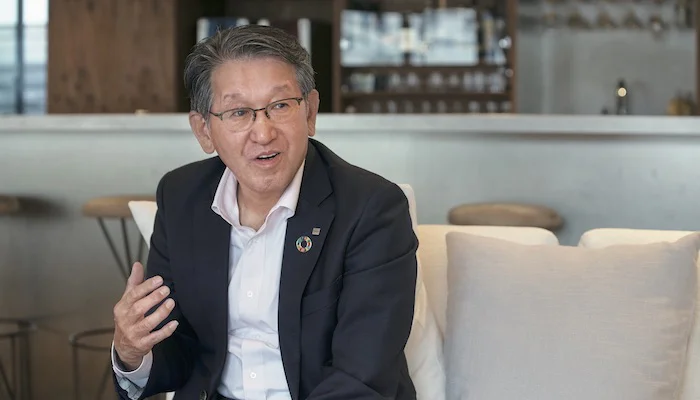
Nakajima: Right, it means you are free to think for yourself and communicate your own ideas. In Japan, we tend to emphasize mutual understanding and harmony and not "to upset the apple cart," if you will. However, you cannot speak up unless you have an opinion, and it is also crucial to build relationships where we can question each other. Above all, it is much easier to be happy when you can freely share with others what kind of person you are. This is also the part of education that needs to change the most. It is interesting to see how similar the things that need to change are in both business and education.
Connect and embrace diverse people, and create collaborations beyond imagination
Yamashita: The word "inclusion" within "Diversity and Inclusion (D&I)" or "accepting" people who are different from us, is also very important. Without this attitude, we cannot create anything new.
Nakajima: That's right. We are currently working on the Future Earth School project, which is a collaboration between STEAM and Expo, by connecting various places, including kindergarten, elementary school, junior high school, high school, university, special education schools, schools for the deaf, and art and science museums. Participants include people with visual and hearing impairments, people with Down syndrome, young children, and grandparents. Together we create music and dance with our "five senses." Seeing how unexpected collaborations arise when the participants' perspectives merge is amusing.
Yamashita: It is great that diverse people can interact with each as equals rather than in a hierarchical relationship.
Nakajima: On the other hand, it is also true that "connecting inadvertently" often leads to the exclusion of diversity. When we intentionally embrace diversity rather than gather with similar people, we can create dynamic connections that bring out the inherent benefits of diversity.
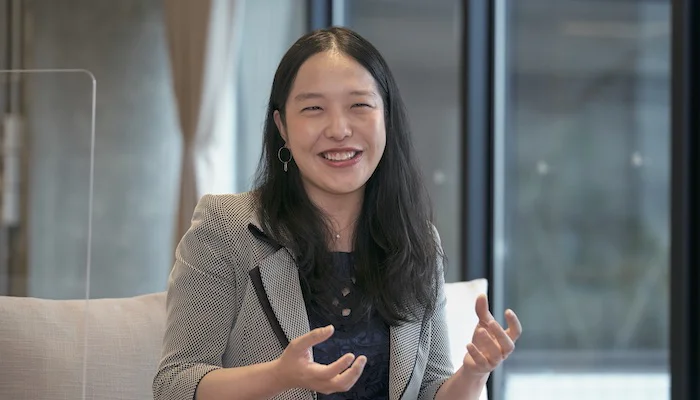
For the 2025 Osaka-Kansai Expo, eight Signature Pavilions will be created under the theme of "Designing Future Society for Our Lives." Under the "Invigorating Lives" theme that I oversee, I named the pavilion "Playground of Life Jellyfish Pavilion." I chose jellyfish as the motif to express "play freely with fluctuation." To foster creativity, I plan to create a space that blends music, mathematics, technology, and play. I hope to create a variety of activities for everyone that will revolutionize learning for "children from 0 to 120 years old," and I would like to invite all of Ricoh's self-motivated employees to share their ideas and opinions with me.
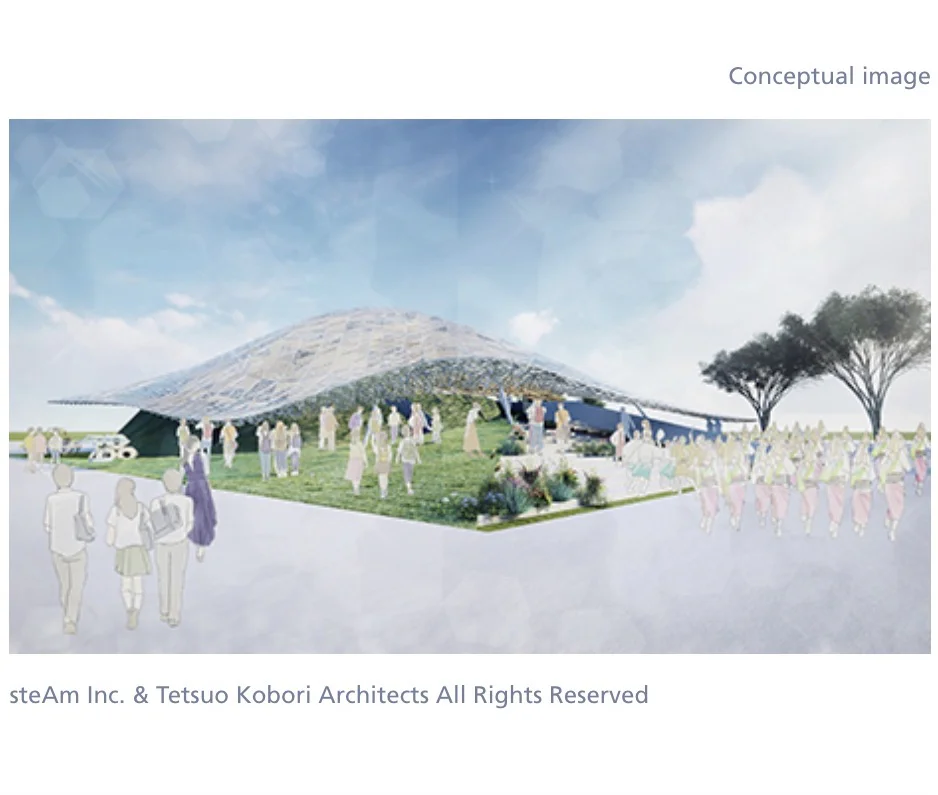
As the pavilion producer, Ms. Nakajima oversees
the "Playground of Life Jellyfish Pavilion" at 2025 Osaka-Kansai Expo.
Designed to resemble a jellyfish, the pavilion is translucent and semi-open, allowing visitors on the outside to see the people playing inside. The idea is that each visitor is unique and irreplaceable, and the building itself has a life of its own.
Ricoh is proud to be a sponsor.
By sponsoring the "Jellyfish Pavilion," a place filled with a sincere desire for people, Ricoh seeks to contribute to areas beyond the boundaries of "work."
Yamashita: Autonomy, creativity, diversity, and a number of other important keywords were mentioned. Ricoh's goal for the future is to be a company where people can work with enthusiasm. If our employees can shine, we can create new value in step with the times and be a sustainable company. To achieve this, we will create new systems and business programs and foster a culture where people of all ages can work happily in an open environment, including with people outside the company.
Nakajima: I encourage everyone at Ricoh to create a society where people can enjoy a fulfilling work style that enriches their lives. Our theme for this year's Expo is "Invigorating Lives." Our goal is to create a place for co-creation where people can experience the joy of life through learning, play, art, sports, and other activities. I hope we can work together to explore a future society in which each individual's life is more vibrant and diverse through trial and error and by bringing together and combining the values of different peoples.
Yamashita: Ricoh is now transforming itself into a digital services company. I encourage all of you to be able to speak for yourselves about Ricoh's spirit, our DNA, and our company. You, the employees, are the embodiment of the Ricoh brand. Be proud and confident of that, and let's work together to make it happen.
This dialogue's venue
Next-generation workplace "3L"
In November 2020, 3L opened its doors as a hands-on facility for research related to "work" in the fully renovated Omori Kaikan building. This site has a long connection with the Ricoh Group.
The next-generation conference space "RICOH PRISM" within this facility is the first of its kind, and enhances the creative "mood" of the teams. The space is designed to stimulate people's five senses, using video, light, sound, smell, and touch to inspire unlimited creativity.
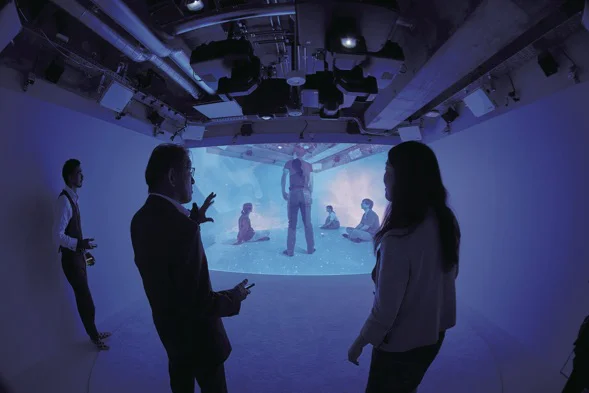
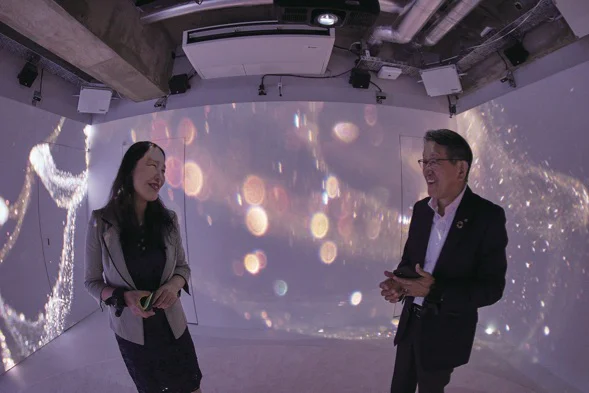
Related Articles
Special Dialogue
Related Articles
#Fulfillment through Work
- Home
- Ricoh Global Newsroom
- Stories
- Ricoh's vision of "WORK" innovation









